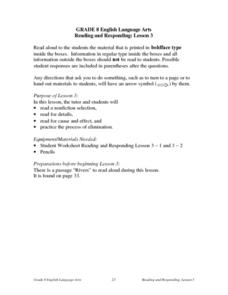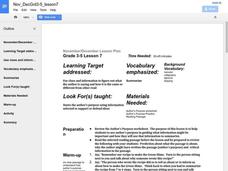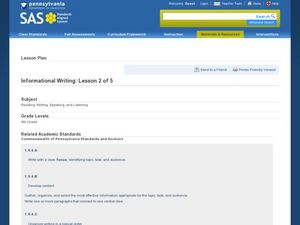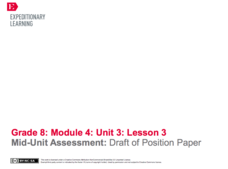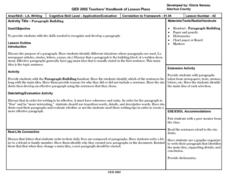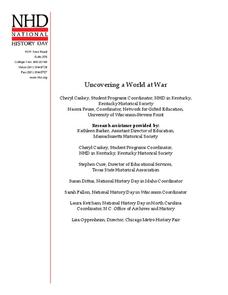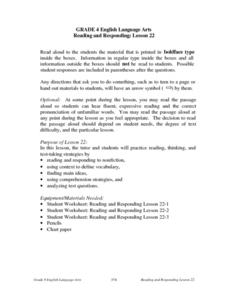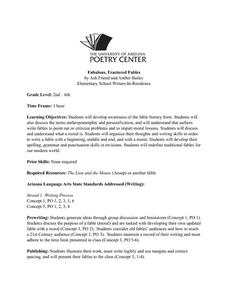Curated OER
Author's Purpose
A simple activity for young readers, this introduces the idea of author purpose. Learners analyze various types of texts (newspaper articles, magazines, books, advertisements, etc.) and determine if the author's purpose for writing was...
Curated OER
Author's Purpose
Sixth graders brainstorm the reasons authors write, and they list their responses on the board. Students discuss each purpose they have listed.Students work independently to read the selection "Tarantulas and Typhoid" by Stephanie Moss....
Curated OER
Reading and Responding: Lesson 3
Reinforce comprehension of informational text. This is a one-on-one lesson intended to build an internal dialogue the reader can use to boost overall comprehension. They work independently with a tutor or teacher to read a nonfiction...
Curated OER
Author's Purpose
Fifth graders determine the meaning of author's purpose. For this author's purpose lesson, 5th graders apply the PIE (persuade, inform, entertain) strategy to determine why an author wrote a piece of writing. They examine passages and...
Pennsylvania Department of Education
Informational Writing: Lesson 2 of 5
Introduce expository writing to your elementary learners. Young authors write a three-paragraph informational paper using the steps of the writing process. They follow guided lessons to experience each of five steps. Included are tons of...
Curated OER
Using Each Trait to Improve Student Writing
Students study examples of each trait in literature. They discuss how each trait adds to the craft of writing and practice revision of a writing piece with a particular trait in focus. They rate their writing on the trait of Ideas using...
EngageNY
Mid-Unit Assessment: Draft of Position Paper
What is the purpose of an introduction and conclusion? Using the resource, scholars review the model position paper from activity one and discuss the author's choices. Next, they draft their position papers' introductory and concluding...
Curated OER
Fiction vs. Nonfiction
Young scholars explore fiction and nonfiction writing. They identify the elements of fiction in a short story and identify the criteria necessary in a nonfiction piece. Students distinguish the author's purpose in an expository text,...
Curated OER
Writing a Letter to a Friend
First graders practice their letter writing skills by writing to a fictional character. In this formal writing lesson plan, 1st graders read the books The Jolly Postman and Frog and Toad are Friends to examine the different parts of a...
Ford's Theatre
How Perspective Shapes Understanding of History
The Boston Massacre may be an iconic event in American history, but perhaps the British soldiers had another point of view. Using primary sources, including reports from Boston newspapers and secondary sources from the British...
Curated OER
Using Color as a Pre-Writing Tool
To better understand how to compose a clear and well-organized paper, learners read short passages, write summaries, and make colored graphic organizers. This is a fully developed three-day activity with suggested assessments.
Curated OER
Reading And Responding: Lesson 15 Nonfiction
Eighth graders examine a nonfiction selection in a teacher led instructional activity. They examine the author's purpose for writing the selection and identify the difference between fact and opinion. The compare and contrast expository...
Curated OER
Maniac Magee: Found Poem
Instruct your readers to scrounge through the pages of Maniac Magee in search for descriptive passages or words they may use to write poetry. As they look for meaningful, sensory descriptors in Jerry Spinelli's novel, readers connect to...
Curated OER
Narrative Writing
A perfect nonfiction writing activity for the beginning of the year, the Life Line helps you get to know your pupils better and helps the children get to know one another. Later in the year the Star of the Week writing activity...
Curated OER
Paragraph Building
Build the skills your budding authors need to develop to compose well-structured paragraphs. Give them the topic sheet (included here), and have them write a cohesive paragraph using the ideas listed. Consider having them include two...
Curated OER
Learning to Analyze Characters
Students discover writing strategies authors use to enhance characters. In this character writing lesson, students are read the Knuffle Bunny books by Mo Willems and analyze the story, characters and settings as they listen. Students...
Curated OER
Writing for Different Purposes and Audiences
Third graders explore how to write for different purposes and for a specific audience or person. They read, Where the Wild Things Are by Maurice Sendak. Students create a class book after reading the story. They each create their own...
Curated OER
Integrated Vocabulary, Creative Writing and Listening Exercise
Students learn vocabulary words. In this reading and vocabulary lesson, students write a word, listen for it in a story and write down what they think it means.
National History Day
Uncovering a World at War
Has media always had an influence on public policy? After researching and reading news articles written during World War I, learners understand the influence of communication and media. They discuss articles in small groups and as a...
Curated OER
Reading and Responding
Fourth graders read and respond to poetry. They identify the author's purpose and connect the literature to their personal experiences. Students critically analyze the poem and write a poem of their own.
Shmoop
ELA.CCSS.ELA-Literacy.RL.11-12.3
Identifying an author’s choice, especially choices that concern craft and literary devices, is a difficult skill to teach. Here's an activity that will make your job easier. The resource breaks down how to teach the skill to novice,...
Curated OER
Fabulous, Fractured Fables
Elementary schoolers develop an awareness of the literary form known as the fable. They explore how authors write fables to pass along moral lessons. After reading and discussing many famous fables embedded in the plan, learners attempt...
EngageNY
TASC Transition Curriculum: Workshop 12
How can opinions slant facts? Workshop participants learn how to examine primary and secondary sources and identify the author's point of view. They also examine how visual art impacts the meaning and rhetoric of sources. Full of...
Curated OER
Captions and Graphic Aides
Fifth graders read a book. In this informational text features lesson, 5th graders define captions and their purpose. Students view an article and discuss the graphic aides that assist comprehending the information presented. Students...




